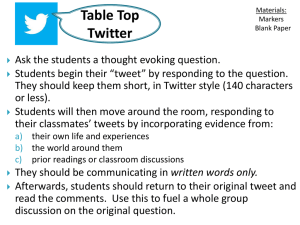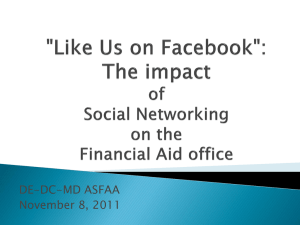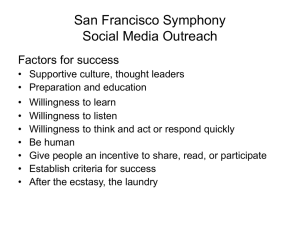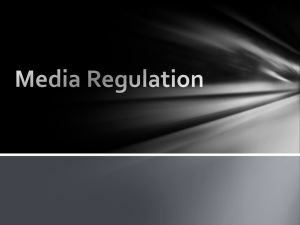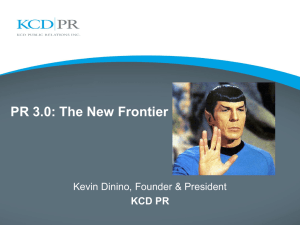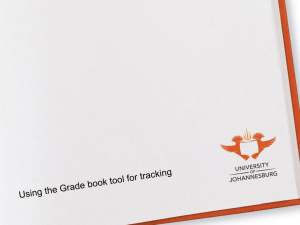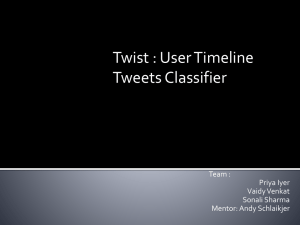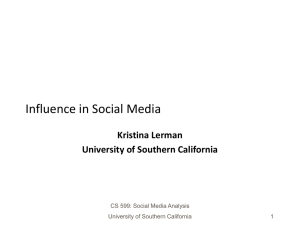Social media for beginners by M Rouprêt
advertisement
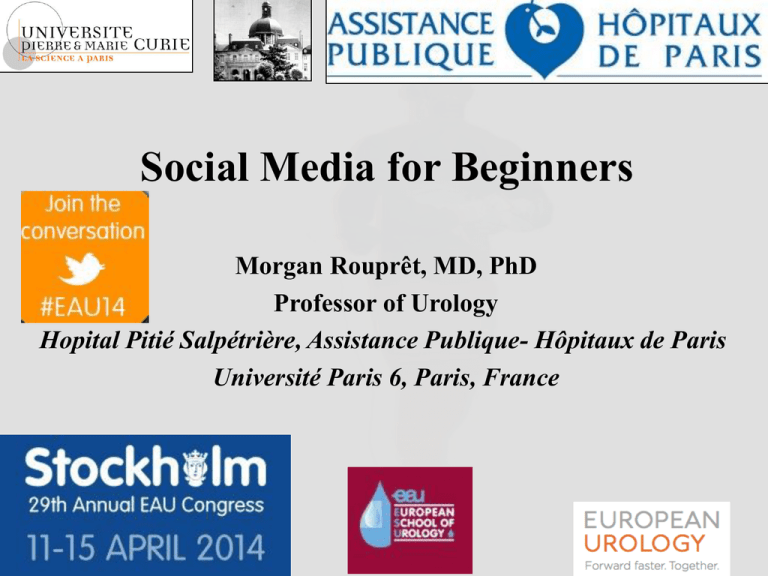
Social Media for Beginners Morgan Rouprêt, MD, PhD Professor of Urology Hopital Pitié Salpétrière, Assistance Publique- Hôpitaux de Paris Université Paris 6, Paris, France Climate changes… Eyjafjallajokull Surgery changes…. Robot a new god? fascination adoration Consumer Demand Role of the surgeon? Popular surgery? EAU changes …. European Urology changes …. http://www.europeanurology.com/social-media A new era of medicine… Introduction The main generalist social media sites are essential in any field of professional life to DISCUSS, PROMOTE, MONITOR and ENGAGE with peers. For researchers a number of sites have become well established as specialist resources to CREATE, DISCOVER, SHARE, DISCUSS and MEASURE research outputs… 7 Social media is user generated content that is shared over the internet via technologies that promote engagement, sharing and collaboration.* * Definition from The Social Media Guide.com Innovation adoption … Percent of population 55 The Internet Revolution 65 46 Billions of Users 21.9 http://www.itu.int/ITU-D/ict/statistics/at_glance/keytelecom.html 24.9 9.6 Social networking – 50% of all US adults 100% 80% 61% 67% 47% 40% 2006 8% 4% 1% 2007 18-29 30-49 26% 25% 33% 13% 11% 7% 2008 51% 35% 25% 20% 71% 52% 48% 49% Pew Internet Project 83% 70% 76% 60% 9% 7% 6% 0% 2005 85% 86% % of internet users 2009 50-64 2010 65+ 2011 2012 Social media is the second Internet revolution. Used w/ permissions GNU License http://en.wikiversity.org/wiki/File:Web_2.0_elements.png http://en.wikiversity.org/wiki/File:Web_1.0_elements.png YOUR PATIENTS Are Using Social Media 80%of all US Adults use the internet 59% go online for health information 25% read other’s health experiences online 20% track their own health info online 18% consult online reviews of treatments /drugs 13% go online to find others w/ similar conditions •Source - Pew Internet project 3% post experience with drug or treatment 60% of patients say Information found online affected a decision about how to treat an illness or condition Source - Pew Internet Project E-PATIENTS engage in communities online to share their stories, disease & treatment information, referrals and support Social media sites have 24 TIMES the activity of healthcare sites HOSPITALS are using Social Media 1,229 US Hospitals • 575 YouTube Channels • 1068 Facebook pages • 814 Twitter Accounts • 566 LinkedIn Accounts • 946 Four Square • 149 Blogs • 4,118 Hospital Social Networking Sites http://ebennett.org/hsnl/ E-Medicine Practices Mobile patient platform Jay Parkinson, MD Video Visits, Instant message visits • Online communication - patients can upload BP, blood sugars, weight data for review online • Online appointment scheduling, refills • Patients pay an annual fee + low costs per visit • No insurance Online, your patients TRUST YOU the most Likely to trust online information from… Likely to share online information from….. 61% doctor 55% Hospital 42% Insurer 27% Pharma 41% doctor 39% Hospital 34% Insurer 28% Pharma Source: PwC Health Research Institute: Social Media “Likes” healthcare Chart pack Physicians & Social Media Use Any Twitter Professional Personal Blogs Blogs Google+ Linked In Source http://www.quantiamd.com/qqcp/DoctorsPatientSocialMedia.pd f MD Communities You Tube Facebook Percent 0 20 40 60 80 100 Why Don’t Docs Engage in Social Media? Liability concerns (73%) Patient privacy concerns (71%) No way to get paid for it (41%) Lack of time (28%) It’s not inappropriate (20%) Not interested (9%) Don’t know the technology (6%) Source - http://www.quantiamd.com/q-qcp/DoctorsPatientSocialMedia.pdf Whether you know it or not - Whether you like it or not You are Online Information in the public domain Insurer’s databases Physician review sites Pharmacy databases Patient websites Social networking sites Don’t believe me? Will YOU engage in Social Media? YES • • • • • • • • Authority Influence Reputation Marketing of practice Patient education Share medical knowledge Crowd-sourcing Expressing yourself NO • • • • • • • • Lack of personal privacy Liability concerns Patient privacy risks No way to get paid for it Takes time Employment Insecurity Being marketed to Being asked for advice online SOCIAL MEDIA – GETTING STARTED • • • • • • PRACTICE WEBSITE – Professional, clean design with simple interface, Dynamic updates, RSS Feed – ? Patient portal (appointment, refill requests),? Online EMR, ? Patient community TWITTER – Each doc has their own twitter page (? + practice twitter for larger practices) – Broadcast health news, commentary & messages – Engagement with colleagues ,Crowd sourcing medical dilemmas – Avoid direct patient interactions LINKED IN – Professional network, useful for job networking FACEBOOK – Keep practice page and personal pages separate YOUTUBE – Patient education videos , medical education BLOG – Can be part of practice website or separate Your patients are not your friends vs. IDENTITY Authority Reputation Control Enhanced practice Employment security Engagement ANONYMITY Privacy Freedom Employment security ?Increases risky online behavior • • • • • • Posts limited to 140 characters Can have private account or public account Users follow other users – Can block followers or be private and only permit certain followers. – You don’t have to follow everyone who follows you Post tweets, comment on other’s tweets, send private messages Hashtags (#) allow for grouping of related posts – Conferences, breaking news, topics of interest, Twitter chats WHO TO FOLLOW? – Experts in your field – Reporters who report in your areas of interest – Medical journalists – Colleagues Doctors on Twitter 2158 tweets from 260 twitter users with >500 followers Nature of tweets 49% Health or medical related 21% Personal 12% Self-promotional 1% Medical education 1 % Recommended medical product 148 Tweets (3%) were Unprofessional 33 (0.6%) Contained profanity 38 (0.7%) Potential patient privacy violations 14(0.3%) Contained sexually explicit material 4 (0.1%) Discriminatory statements JAMA, February 9, 2011—Vol 305, No. 6 567 Twitter Smarts (@DrWes ) 1. Follow smart people doing work that is relevant to yours. Trash most others. 2. Post relevant, valuable content of interest to your followers. 3. Watch your time on Twitter. At most, I spend 20 minutes a day on Twitter, and I think it would take me far more time offline to gain and share the same information. 4. Do not EVER post patient information – Tweets are public and searchable on Google. Twitter Not-so-Smarts @mommy_doctor ) The Eleven Commandments of Social Media Engagement 1. Observe, Listen & Think Before Engaging What are your goals with this tweet/post/comment? Is this the best platform? 2. Add Value. Be relevant. Be Accurate. Research & attribute your sources. 3. Maintain patient privacy – Don’t post anything about a patient that he/she would recognize themselves. Go beyond HIPAA. Stay away from patient-specific dialogue. 4. Be Respectful. Keep it Civil. Keep it Clean. Don't post material that is profane, libelous, obscene, threatening, abusive, harassing, hateful, defamatory or embarrassing to anyone. 5. Abide by the law. Don't post content that violates any state or federal laws. Get permission to use or reproduce copyrighted content. 6. Be Transparent. Disclose affiliations and conflicts. Clearly identify any advertising as such. 7. Remember - What happens on the Web stays on the Web. Forever. Even if you delete it. 8. Engage with others. Social media is not a place for you to talk without listening, commenting and responding to the conversations around you. 9. Don’t give individual medical advice online 10. Patients are not your friends. Keep your individual Facebook page private. 11. Be yourself. That’s what social media is all about. Show your personality. Modified from Vanderbuilt University Med Center Social Media Toolkit ESU course: the twitter contest! st 1 Rank Take aways Engagement with peers through social media… and especially specialist media for researchers… can accelerate professional development by: Enhancing your profile in professional networks Increasing your efficiency in the discovery and monitoring of information, new developments in your field Exposing your work in multiple channels for improved discovery, readership and even citations Improving chances of collaboration with researchers internationally Demonstrating the wider impact of your work beyond traditional citation metrics Social Media for Beginners Morgan Rouprêt, MD, PhD Professor of Urology @MRoupret morgan.roupret@psl.aphp.fr


